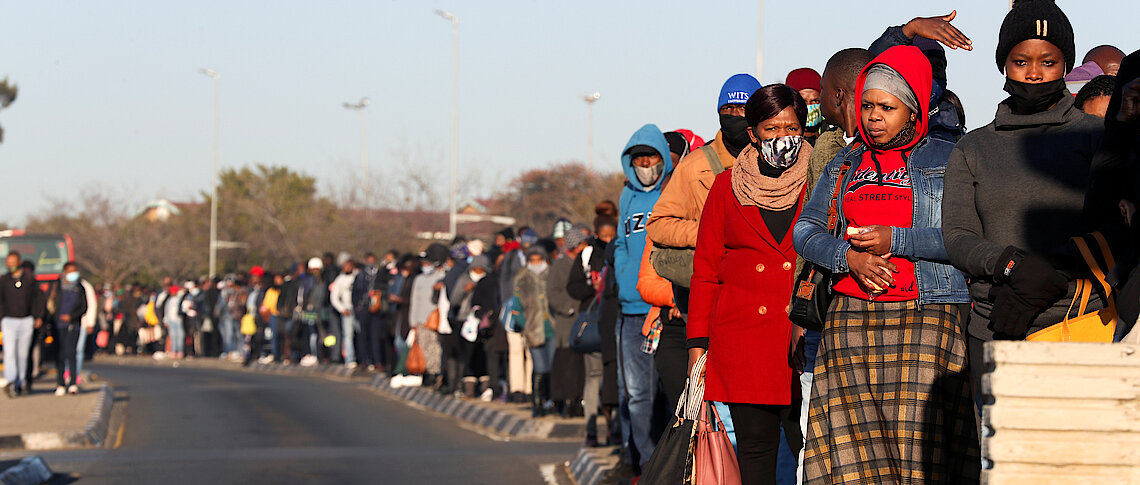Read this article in German.
The global impact of the corona pandemic is not yet entirely clear. However, we already know that 2020 will go down in history as a year of deep economic crisis. Borders have been closed, supply chains have been disrupted and some observers have already declared this to be the end of liberal globalisation.
At the same time, the situation in the countries of the Global South features less and less in the media of the Global North. At best, there is a discussion about dysfunctional health systems, the alarmingly high death toll in Brazil or the hygiene problems in the informal settlements of cities experiencing exponential growth.
The issues that are receiving less attention include social justice and extreme global inequality – these have been exacerbated by the crisis and by the reactions of most governments in the world. In the aftermath of the coronavirus, the magnitude of the social crises will depend above all on the individual governments’ responses in the area of economic and social policy. But here, the situation of countries in the Global South differs drastically from those in the Global North.
While the European Union has put together an aid package of over €750bn for Europe’s economic recovery, most countries in the Global South have little room for manoeuvre in economic policy. The African Union’s Covid-19 Response Fund has a mere USD 70 million available.
The fact that African economies will have to make approximately USD 16bn in ongoing interest payments this year alone shows how small that amount is in comparison. The threat of new debt crises is currently looming over many countries. To cite just two examples, Ecuador and Argentina are negotiating with their creditors about the possibilities of restructuring.
Countries like Ghana stand as exceptions: thanks to solid government finances, the Bank of Ghana was able to lower its key interest rate and adjust its capital requirements so that companies can be provided with liquidity. Overall, however, governments in developing countries approach this issue with caution: fears of high inflation and concerns about the fragility of financial systems tend to take priority. Only those who can create money themselves or take on debt on good terms can afford to have an expansive monetary policy.
The crucial role of the state
One general problem is that many governments’ sources of income are hardly diversified and depend heavily on developments vulnerable to crises. It was primarily the dramatic slump in the oil price that hit raw material exporting countries the hardest. As a result, many state budgets in Latin America, Africa and especially in the Middle East have experienced a rapid decline in their income.
According to current estimates, remittances from migrant workers are set to decrease sharply in the wake of the corona crisis. In addition, international tourism has come to a complete standstill. This leaves the question of how states should finance themselves. In most countries in the Global South, the national elite hardly participate in the financing of public budgets and tax rates are rather low. And in rentier economies, classic tax instruments play only a subordinate role. In these cases, political conflicts are primarily a matter of access and distribution of revenues accumulated by the states. The oil price is therefore resulting in the worsening of existing political crises. This can be seen most clearly from examples such as Venezuela, Iran and Libya.
In many countries, the loss of income means that appropriate political responses to the crisis in the form of social programmes are simply not affordable. This will presumably have a significant impact on the fight against poverty and the achievement of the other development goals that are part of the SDGs set by the UN General Assembly.
Economic, financial, and international trade policies must also find answers to the problems of global inequalities beyond just development instruments.
Some countries with a social welfare system in place might still be able to cushion some of the effects of the crisis. However, the urban middle class often benefits more from government benefits, while a significant portion of the rural and poor population has no access to any system of social security. Without government regulation and funding of employment programs such as short-term work, labour markets will be hit hard.
In many development economies, the formal sectors suffer from lockdown policies, while precarious and informal employment is likely to increase. This will further exacerbate inequality, fuel distribution issues at a time of scarce resources and exacerbate various social conflicts. This amounts to a toxic mixture, on top of the already high level of dissatisfaction worldwide. The waves of protest in 2019 in places such as Algeria, Lebanon, Sudan, Haiti, and Chile were probably just a preview of turbulent times ahead.
Pressure on democracies is growing worldwide
Overall, the pressure is growing on democracies, which are already undergoing a stress test from coping with the assorted crises of the recent past. For years, many African countries have been part of a global systemic competition for influence and power carried out at their expense. The geopolitical tensions between the United States and China have become all the more apparent over the past few months, to the detriment of democracy and human rights.
The coronavirus has hit many societies in the midst of pre-existing political crises. During this pandemic, some regimes have managed to significantly expand their hold on power, as shown by the transitional government supported by the military in Bolivia. In these countries, political opponents and parts of civil society could be suppressed under the pretext of preventive health care. In general, political resistance in many countries in the past few months has only been possible under harsh conditions. As a result, political decisions could be made without democratic participation of the population, which will have far-reaching effects on the shaping of our future co-existence.
The public and the political decision-makers of the North should keep these developments on their radar during the gradual return to normality taking place here. It is not only the pandemic and combatting it that take on a global dimension; the economic consequences worldwide will continue for a long time to come and create enormous social problems in many countries. Only those countries with appropriate economic policy room for manoeuvre will be able to effectively counteract this. In order to do so, they need adequate international support. This is not just a matter of debt relief, but also about financing comprehensive political solutions to the current crisis.
Economic, financial, and international trade policies must also find answers to the problems of global inequalities beyond just development instruments. It will not be enough to launch large stimulus packages in the Global North if the IMF continues to implement austerity policies in the South.
Anyone who advocates democracy and human rights should be gravely concerned. There is currently little evidence that the distributional conflicts can be resolved democratically anywhere. The situation in many countries has already been too tense. But, especially in times of crisis, we need democratic mechanisms and ways to fairly negotiate issues affecting the common good, with the broad participation of all social groups. Ultimately, the major issues of the progressive agenda – that is, social justice and democracy – are at stake.






